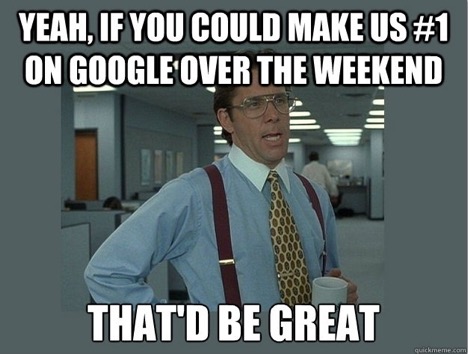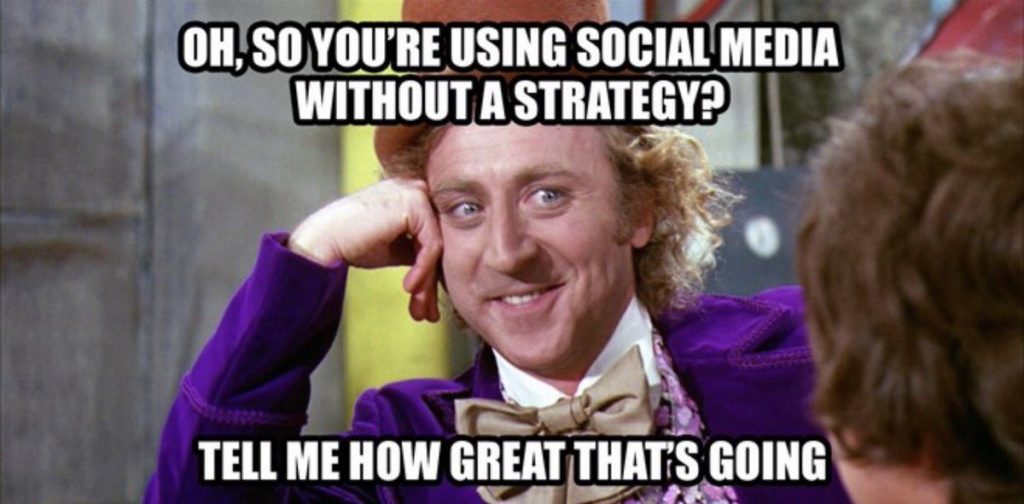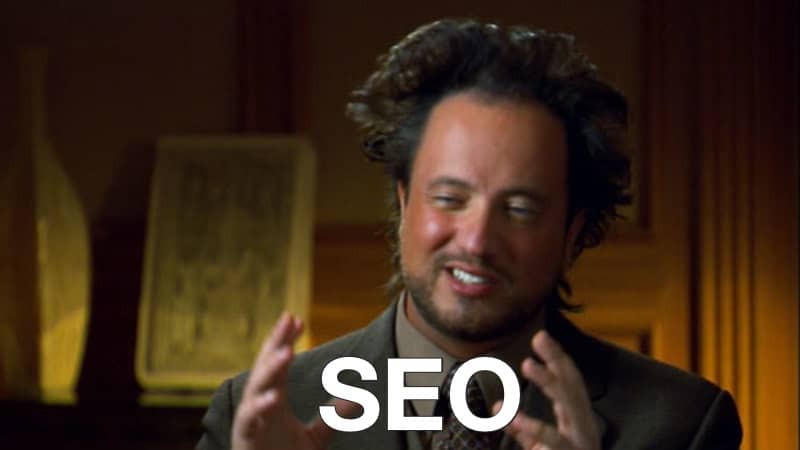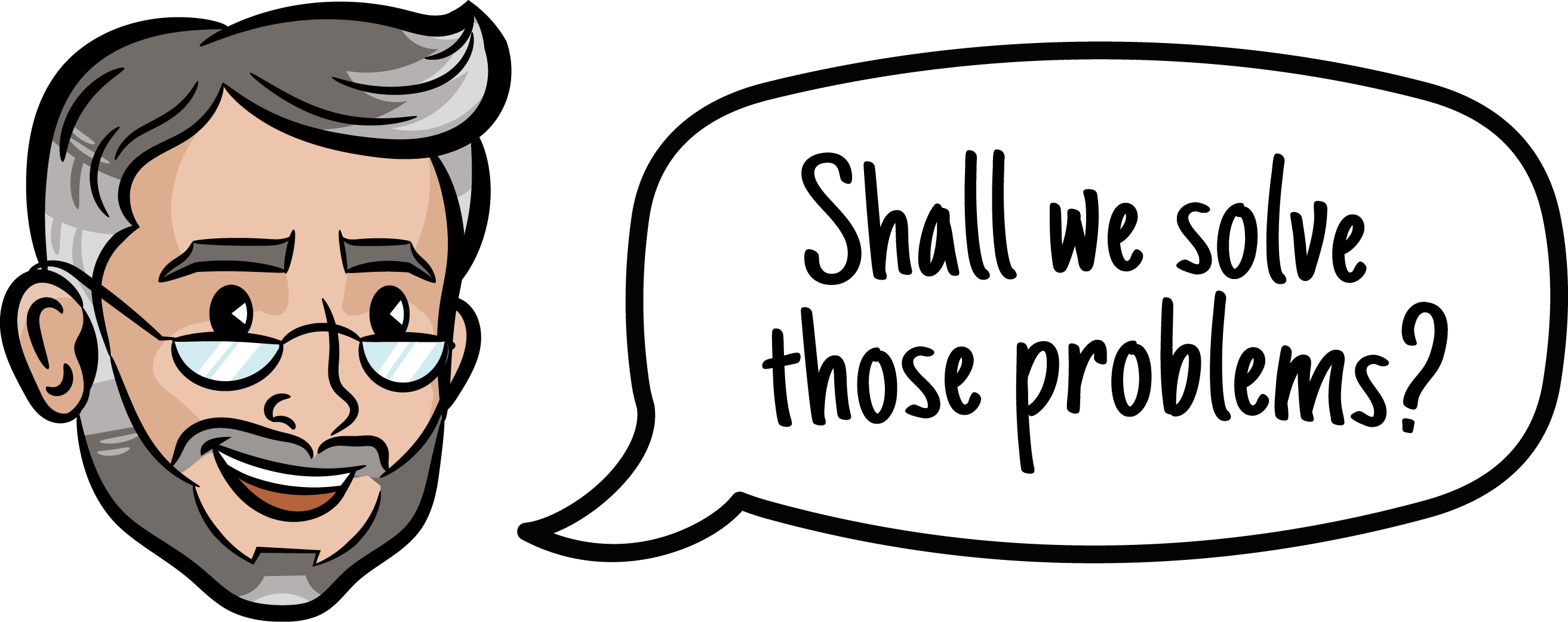Table of Contents
Purpose of Identifying Keyword Types in SEO
Brand Keyword Type
Vanity Keyword Type
Awareness Keyword Type
Money Keyword Type
Documenting Keyword Types in Your SEO
Priority #1: Get Your Money Phrases into the Top 10
Priority #2: Create Bridges from Awareness-Ranking Pages to Purchase Actions
Priority #3: Get Your Attribution System in Order
How Can Sales Funnel Professor Help?
A couple weeks ago my friend, Neil Bainton, asked me to give a startup he’s coaching some tips on making money with their SEO and that starts with understanding the 4 keyword types.
The company is already successful via other channels, and with some simple tweaks to the way they think about SEO, they’re going to get way more revenue out of their content creation as an inbound SEO sales funnel.
At Sales Funnel Professor, companies from all over the world reach out seeking a CRO expert, meaning they originally think they have on-page messaging and design challenges that could be improved.

That’s often true, but we then quickly show them how they have a huge-ROI, low-cost opportunity to increase their SEO as top of funnel.
Keyword types are a foundational concept that will help you better understand your SEO funnel and how to optimize your middle of funnel and bottom of funnel approaches for it.

Professor’s Note
In this instance, CRO means “conversion rate optimization.”
The other common use of CRO is the abbreviation for “Chief Revenue Officer,” which is typically a company’s most senior sales executive.
Purpose of Identifying Keyword Types in SEO
Why should you identify the types of keywords that your site is ranking for? In a word: Money.
Companies that want Google to display them as a search result want to monetize “organic search traffic.”
When your site comes up in the top 10 results or even better, the top 3 results for a phrase, you’ll get visitors…some of whom you hope will eventually become closed won: your customers.
But to achieve a fully functioning SEO funnel, you need visitors who are actually potential buyers for your product or service. You can tell a lot about their intentions by the search phrase on which they arrived at your site.
Here’s how to segment those phrases:
Brand Keyword Type
This is probably the simplest keyword type to understand. If your company has people who already know about it, they’ll often search the name of it instead of typing out the URL exactly.
Let’s use the phrase “Sales Funnel Professor” as an example.
When this company came to life in late 2022, Google very quickly ranked this site in the #1 position for that phrase. Why? Because it’s a unique phrase that is also the name of the company. In good theory, Google wants to give searchers the result that they most likely want at the top.
Assuming the name of your company is unique, you’ll have similar results and should have phrases that contain your name in the top 10 of Google with little to no effort (if your site isn’t doing things Google doesn’t like).
That’s good for SEO, right? Kind of.
Ranking for your own name is table stakes. If you’re investing in SEO as a source of business and only have top 10 results on phrases that contain the name of your company, you’re not really getting ROI.
Remember that top-of-funnel sources are for finding the right strangers. Even though a CRM like HubSpot will tag a contact to original source “Organic Search,” if they searched your company and clicked your link in the results, that person is not at the top of funnel. They already knew about you, so they’re in the middle of the funnel.
If you’re paying an SEO agency and your top 10 results mostly contain your name, they haven’t helped you much, if at all.
So when you start to do funnel math, you don’t want to treat customers who searched you by name as return on your SEO investment. They were introduced to you somewhere else.
Vanity Keyword Type
Another SEO word type that can be mistaken for progress is called a “vanity phrase.”
An impressive cloud storage company from Spain that was investing heavily in SEO asked us to take a look at their funnels. Think of them as a new spin on Google Drive or Dropbox.
They were writing content and crosslinking and backlinking to try to get buyers of their encrypted, privacy-centric storage solution.
And their SEO leader chose phrases like: “great names for WIFI” and similar and got to the top of Google for those to the tune of 1000s of visitors a month.
SEO Leader: Great news! We’ve added 1000s of new visitors!

CEO: Awesome! Now can you tell me how we’re going to sell encrypted cloud storage to people who need inspiration for coming up with a router ID?
What probably happened here is someone found some very low competition, high volume phrases and started working on ranking for them without a strategy.

Horror Story
This poor startup had 3 true marketing team members, was struggling to make money, and thus was struggling to raise money.
But they had spent some of their precious capital on ranking for all kinds of vanity phrases to the point that they were getting 60,000 plus visitors to the site who would never in a million years buy their product.
Their SEO was actually a huge money loser because not only were they paying for that content production and backlinking and crosslinking, but all that vanity traffic was clogging up their analytics and making it much harder to analyze the small pieces of their funnels that were actually working.
Marketing agencies that focus elsewhere struggle with this, too. An agency whose owner has even written a book has a website that ranks in the top 10 for almost nothing that can be monetized, but the site does rank for “closed office space.” Yikes!
Awareness Keyword Type
Hopefully the SEO lead working on the encrypted storage solution based in Spain thought they were doing awareness. Awareness in SEO is a lot like doing Organic Social posts.
You’re looking to steal someone’s attention for a few seconds, ideally build some trust, and hopefully be memorable enough that they come back and purchase eventually.
On Instagram, end-users are primarily browsing for entertainment purposes, but brands can post as themselves or pay influencers to post about them. Ideally, those influencers have influence over what your ICP purchases.

Those posts end up in someone’s feed and count as touches. Put enough touches on the same person and they’ll eventually know who you are.
Awareness in SEO is a similar concept. You’re trying to rank for something that your ICP might care about, but that isn’t actually what you sell.
At Sales Funnel Professor, people pay us as consulting firm. They want a funnel builder to scale their revenue quickly.
But people that have sales funnel problems are also researching terminology and potential solutions before they are actively searching for the person or firm that can do it for them.
So we rank for all kinds of sales jargon phrases that our future customer might be searching: coffee is for closers, purple cow meaning, what is hot jar, etc.
For business services companies, you can do awareness SEO about tools, tactics, best practices, etc. that your ICP might care about.
But keep in mind that your awareness phrases will only really drive revenue if you have a way of getting subsequent touches on your prospects. Use retargeting, have a newsletter sign up or white paper download, etc. so that touch 1 is quickly followed by four or five more touches as quickly as possible.
Neil’s friends have an ICP that rides mountain bikes. They are doing a great job in the awareness arena with articles about mountain biking trails that rank in the top 10 of Google. They sell bike water bottles.
Money Keyword Type
Most companies that invest in SEO want to see “money phrases” immediately.
A money phrase in SEO is what someone who is ready to buy what you sell today would search in Google if they didn’t know from whom to buy it.
Of the keyword types in SEO, this is the one that primarily drives revenue. Agencies that do marketing but not sales often call these “phrases with purchase intent.”
At Sales Funnel Professor, we measure success against actual revenue generated, so we call these “money phrases.”
When you have money phrases ranking in Google’s top 10, and a website that’s great at touch-1 conversion, you get spectacular results.
We built a brand for our friends at GarbageCanCleaning.com They build their own specialized can cleaning trailers so a money phrase for them is “trash can cleaning trailers for sale,” and they do a great job of answering interested parties and shipping their trailers all over the country.
We helped our friends at Corporate Tax Advisors build their inbound funnels. They are the #1 result for “r&d tax credits consultation.” That’s a money phrase for them.

They also rank for “corporate tax advice” but that’s an awareness phrase for them. Why? Because they don’t do generalized corporate taxes. They only focus on complex tax credit and incentives work in conjunction with a primary CPA.
Documenting Keyword Types in Your SEO
If you want to check up on your agency or internal team’s progress, a great place to start is to export all the phrases for which you come up in the top 50 results already into a spreadsheet. Create an extra column for “Keyword Type.”
Then choose one of: brand, vanity, awareness, and money for each row/phrase.
Priority #1: Get Your Money Phrases into the Top 10
Do you have any money phrases in the top 10 results? If you’re reading this article, perhaps you don’t.
But what about money phrases in the top 50? If you want to actually make money in SEO within the next quarter (and next month if you’re lucky), focus on getting your money phrases in positions 11-50 into the top 10.
Clicks on those phrases will get your ICP to your site while they are in the buying cycle.
Priority #2: Create Bridges from Awareness-Ranking Pages to Purchase Actions
Many sites (like this one) blog about topics that are of value to their potential clients.
Imagining that your client lands on a blog page about an awareness phrase, what can you do to let them know that you actually can provide value for your paid services as well?
Many companies have blog pages that have no calls to action at all. Consider adding those. We use a simple “lead magnet” in both the header (see the yellow banner at the top of this site?) and at the bottom of each page.
When you get someone to your site, be sure you ask them to take the action that you want.
Priority #3: Get Your Attribution System in Order
Whether it’s SEO as top of funnel, or PPC or an ABM funnel, you want to know where each piece of closed business came from. Good CRM hygiene includes being sure you can attribute your revenue to the first touch, top-of-funnel source that produced it.
SEO is an investment. You have labor spent on research, writing, configuring your website, and building crosslinks (internal) and backlinks (external). As you start to get into the top 10 of Google for money phrases, you can look at what deals eventually closed and know when you are ROI positive and then ideally, extremely profitable.
How Can Sales Funnel Professor Help?
Fixing broken SEO funnels and teaching teams how to grow their organic search top of funnel are common inclusions in our Head of Growth services. While we don’t provide a fractional SEO consultant service as a standalone service, we’ve used SEO to build 8-figure inbound funnels in less than a year for a number of companies.
If we haven’t met already, feel free to book a free 30-minute consultation. We’ll be happy to look at your SEO rankings and point out what phrases fall into each category.
If you want to actually get into the top 10 of Google for phrases that your target audience cares about, we’ll be happy to talk you through what that work would cost as well.



